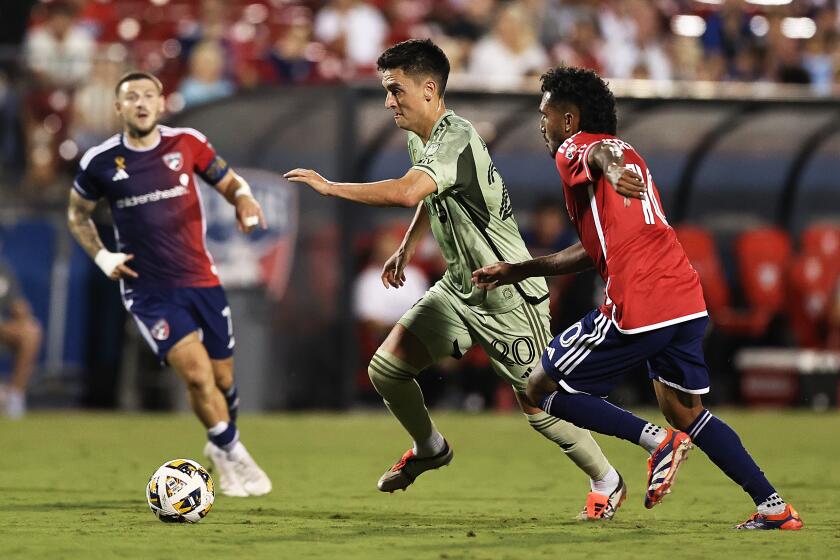Kick in the pants
The United States hasn’t prevailed in Mexico City since Ulysses S. Grant and Robert E. Lee fought alongside each other to vanquish Santa Ana, but the American soccer team will try again today as it takes on the Mexican national team in a key World Cup qualifying match in Azteca Stadium. Despite how fiercely competitive the U.S.-Mexico soccer rivalry has become in the last two decades, the Americans have never won in Mexico City.
For many Angelenos, today’s game, though played south of the border, is a source of anxiety and soul-searching about identity amid conflicting loyalties. And for many other Angelenos who don’t share in that conflicted anxiety -- and may not even care about the sport itself -- the sight of Mexican immigrants in Los Angeles waving the Mexican flag or cheering on El Tricolor (as Mexico’s national team is affectionately called) is Exhibit A of how these new Americans aren’t quite assimilating in the same way that previous waves of immigrants did.
Sometimes I wonder if Washington’s efforts to enact comprehensive immigration reform a few years back might have succeeded if God hadn’t invented soccer. The heated soccer rivalry between neighbors is the gift that keeps on giving for anti-immigration crusaders. What’s particularly troubling to this crowd is that because of the rising number of Latinos in the U.S. -- and the demographics of the soccer fan base -- the Mexican team enjoys home-field advantage when playing against the U.S. in either country (the Americans forced Mexico to play the last World Cup qualifier in Columbus, Ohio, in February in an apparent effort to minimize the number of Mexican fans in the stands).
Early on in his 2004 book, “Who Are We?” Samuel Huntington contrasted the scene at a 1998 U.S.-Mexico match in Los Angeles -- 91,255 fans “immersed in a sea of red, white and green” flags cheering on Mexico -- with past immigrants “who wept with joy when, after overcoming hardship and risk, they saw the Statue of Liberty [and] enthusiastically identified themselves with their new country that offered them liberty, work and hope... .” You get the idea.
Nonsense, I say. If an Irish team had come to play the United States in Boston or New York a century ago, I’m guessing the stands would have been awash in green.
I have to confess I am part of the “problem” here. If Mexico and the United States go to war again, I’ll be rooting for the Yanks, but having lived in Mexico until the age of 15, I still have a hard time not rooting for Mexico when the two countries play, given that my boyhood soccer loyalties are all rooted in that country and its league. It is very hard -- a bit sketchy even -- to alter your sports loyalties later in life, as any transplanted Bostonian or Chicagoan in L.A. will tell you.
There is an additional dynamic at play, a matter of sheer equity, when it comes to soccer. This sport is everything to Mexico, while on this side of the border hundreds of millions of Americans today will go about their business unaware that the two countries are even playing. This is what is galling to the rest of the world, not just Mexico, about the rise of the United States in soccer -- it is happening without most Americans being emotionally invested in the sport.
In terms of the Mexico-U.S. rivalry, the fact that Mexico’s all-consuming obsession with today’s game is unrequited is symbolic of the larger relationship between the two neighbors. President Obama was in Mexico earlier this week for the annual summit with his Mexican and Canadian counterparts (“Hey, remember us, your neighbors and trading partners?”), a perfunctory gathering devoid of any of the buzz, friction or hope attached to summit meetings with countries that, well, matter in the pantheon of American diplomacy.
When I was a kid in Mexico, there wasn’t much of a rivalry between the two countries on the soccer pitch; Mexico reliably clobbered the United States, which for most Mexicans helped make up for everything else. The American national team didn’t beat its Mexican counterpart between 1934 and 1980.
But in recent years, as soccer has taken off as a youth sport in the U.S. and with the advent of Major League Soccer -- two developments that have produced a generation of far more talented players in this country -- the Americans have gained the upper hand in the struggle for regional supremacy. Mexicans feel deprived of the one contest in which they could vanquish the superpower to the north. An unprecedented win in Mexico City today would ratify American supremacy and jeopardize Mexico’s attendance at next year’s World Cup in South Africa (only three, possibly four, countries from Central and North America will qualify, and Mexico has already suffered upsets to Central American teams).
My brother and I have had numerous arguments on who the real underdog is in this rivalry. My sympathies are with Mexico, taking a broader “it’s all they’ve got” view. Roberto, looking at it more from a narrow soccer perspective, feels the scrappy American team is still the underdog, overtaking what was once the undisputed regional soccer hegemon. Indeed, one of the ironies of the American ascent in the soccer world is that it may be partly because of the relative poverty of the domestic market. The fledgling MLS can’t afford to retain many of the top American players, who instead play in more competitive European leagues, which makes them a more formidable all-star squad when they come together to play under the U.S. flag (the national team, like our Olympic “dream team” in basketball, is essentially an all-star team of players whose day jobs are with club teams such as the L.A. Galaxy or clubs in Britain).
Mexico’s league, by contrast, is one of the richest in the world outside of Europe, meaning fewer of its players feel the need to play overseas and become accustomed to the faster-paced game the American players are competing in overseas.
There’s an interesting economic parable in there somewhere too, but I digress.
It’s only a game, after all. Really.






